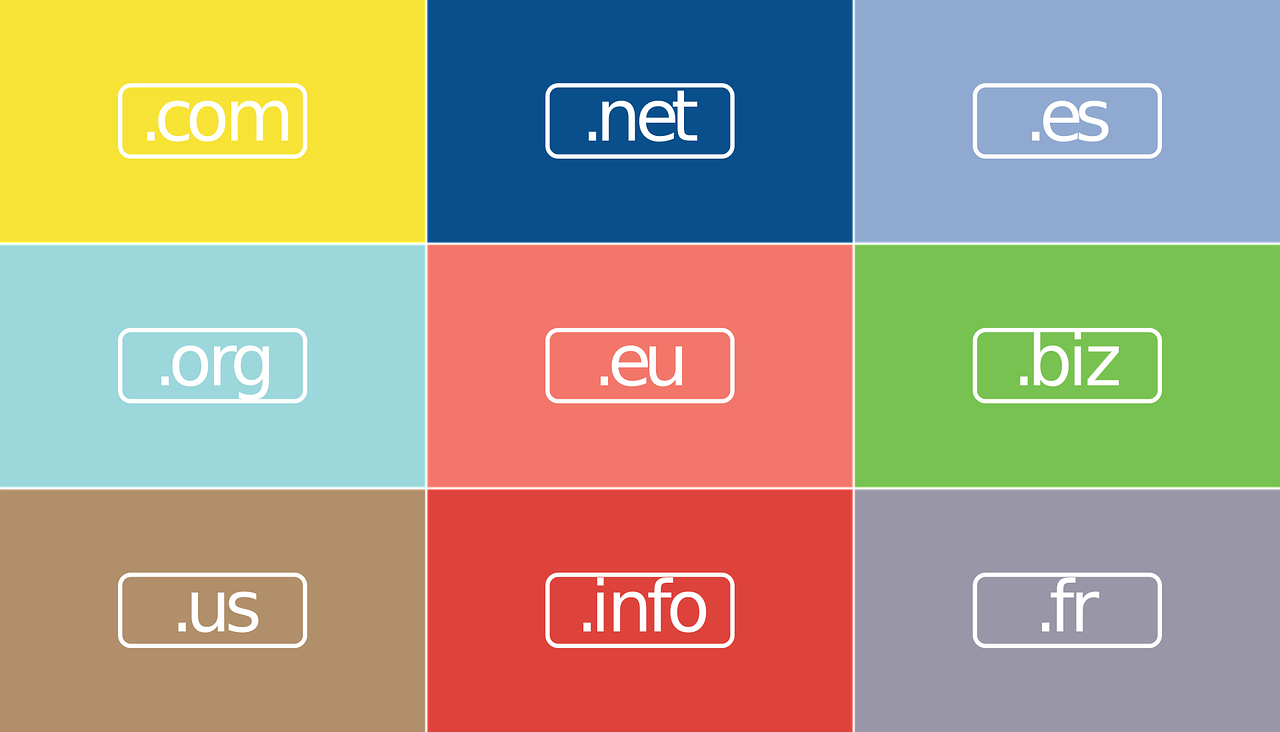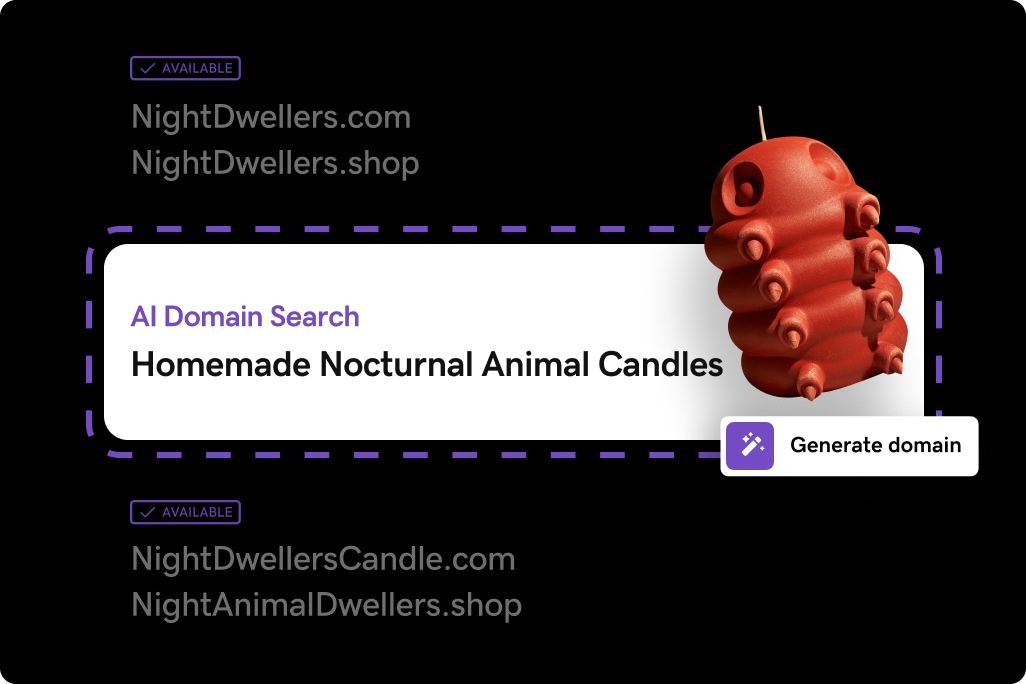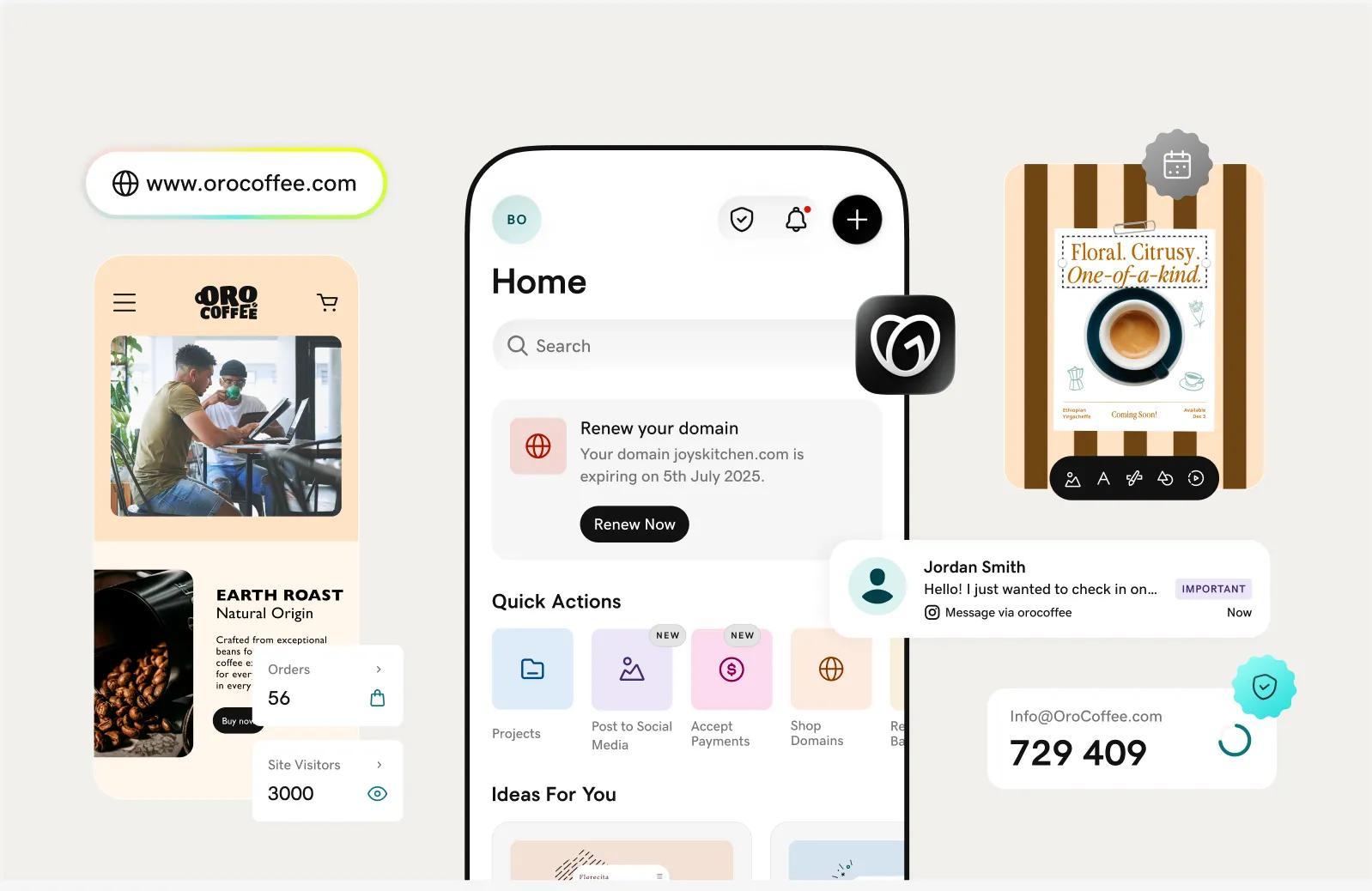Quick… think of any web address. For many people, one that ends with .com springs to mind. So it makes sense that the aspiring entrepreneur might get very discouraged when the .com they picked for their website or business name is already taken.
While it’s true the .com domain enjoys a dominant position, it’s also important to consider that there are more than 1,000 TLDs available for registration today. If the .com you want has already been registered by someone else, it’s hardly a reason to give up on your idea.
It’s really just an opportunity to get more creative with your branding.
And that’s what we’ll look at in this post. We’ll go back through the history of the .com domain and examine where it sits today. We’ll also go through scenarios when you might consider alternatives to .com, explore those alternatives, and examine the implications they can have for a business.
Ready to dive in? Let’s do this!
The evolution of domain extensions from .com to today
While the history of domain names reaches back to the 1960s, the .com TLD didn’t emerge until the early 1980s, when it was created to designate commercial entities. It was one of the original domain extensions, which also included .org, .net, .edu, and .gov.
By the 1990s the internet was seeing explosive growth and .com became one of the most common domains, adopted for use by anyone.
Today, there are more than 150 million .com domain names registered, making it the most common domain extension in use.
Despite the widespread appeal of .com, looking at alternatives opens up many opportunities for the business owner just getting started. And established businesses, too, could unlock an array of benefits by maybe rebranding with a new domain.
Why your domain extension matters in branding

When you’re getting a business started, it might be tempting to rush through picking a domain and grab the first decent one that’s available.
Slow your roll! There’s a lot to consider with domain names.
Let’s talk through three of the most important aspects:
- Trust: A relevant domain name signals you’ve invested in your operation, unlike some fly-by-night operation that might disappear unexpectedly.
- Memorability: While every domain has a purpose, some of the more complex or uncommon TLDs might be difficult to remember.
- Positioning: A domain name can be an opportunity to say something about your brand, so consider how it positions your business.
It’s no wonder domain registration is one of the most important branding strategies for small budgets.
Let’s try a real-world example: What’s the web address of an online encyclopedia that’s free to use and accessible for anyone to edit or update? You probably came up with wikipedia.org in just a few seconds.
But what if that address was wikipedia.com or wikipedia.net? Something would be a bit off, wouldn’t it? That .org speaks volumes about the non-profit and public-spirited nature of Wikipedia — anything else just wouldn’t work as well.
Pro tip: For even more actionable advice, check out this guide to branding your business.
When and why to consider alternatives to .com
There are plenty of times when you’ll find .com isn’t going to get the job done. Let’s walk through a few of the most common scenarios:
- Unavailable: This one’s pretty straightforward. The .com has been around so long that, naturally, more of them have been scooped up. While it is possible to get a domain that someone else owns, it might be easier to simply look elsewhere.
- Not relevant: Looking back at the example we just covered with Wikipedia, sometimes .com just isn’t a good fit. Good thing there are so many other domain extensions available. Just keep looking, and your perfect domain will eventually show up.
- Audience: While .com is very recognizable, it’s one the most common domain extensions and doesn’t have specific appeal. But, for example, gamers can identify with the .gg TLD, as those letters are also an abbreviation used in chats for “good game.”
- Uniqueness: If you’re going to pony up for a domain price, make sure you’re getting something awesome, not a name that could be seen as generic. With all the websites live today, standing out from the crowd has never been more important.
- Keywords: While a domain extension doesn’t affect SEO, your domain name as a whole should include keywords that match search intent. That alone can be a good reason to look beyond .com to TLDs with greater availability.
If you bump into any of these scenarios, don’t sweat it. While .com can be a great option, it’s not the only one. In fact, you can use our domain name generator tool to brainstorm creative ideas for domain names with alternate extensions.
The top .com alternative domain extensions
Now that we’ve learned a bit about the .com domain and when you might need to consider other options, let’s take a look at what those options are. Read on to learn about the best alternatives to the .com domain, organized by what they’re being used for.
As you peruse these domain extensions, consider what would be an ideal fit for your brand, audience, and industry.
Pro tip: Level up your knowledge about TLDs even more with our domain extensions guide.
General-purpose extensions
With their versatility, general-purpose extensions are a great choice if your business or idea doesn’t fit neatly into a single category. These TLDs are also great when you’re just getting started and a little unsure about the direction you’re headed.
Here are some of the top general-purpose domain extensions:
- .net: One of the original domain extensions, .net is typically associated with businesses. It’s a good choice if most of the work for your venture is conducted online.
- .org: Dot org is also an original TLD and mainly related to non-profit organizations, although anyone may register it. This domain is a must-use for philanthropic projects.
- .co: Originally reserved for individuals and organizations in Colombia, .co today is considered a shorter, hipper version of .com, making it a great general-purpose TLD.
- .biz: A .biz domain makes it clear you’re online to do business, so it’s a good choice for distinguishing yourself from similarly named individuals or organizations.
- .info: The .info domain signals information sharing, like a blog or wiki, making it a no-brainer if you’re getting online to provide access to your knowledge and information.
- .online: If you operate a brick-and-mortar establishment along with your online property, the .online domain can help differentiate your physical and online operations.
Tech and innovation extensions
When you’re operating in the tech sphere, people will likely expect your branding to be on point. And that centers on a domain extension that speaks to your savvy and innovation.
Here are some of the top domain extensions for tech and innovation:
- .io: With its abbreviation for “input/output,” the .io domain extension is popular within the tech sector. Examples include the notable GitHub.io platform for developers.
- .ai: The .ai TLD is a natural for companies building artificial intelligence tools and services. Examples include the pioneer Open.ai and marketing tool Jasper.ai.
- .tech: Dot tech is a solid pick for technology companies in general or anyone operating in that sphere. Examples include the AI provider AIInnovation.tech.
- .dev: A .dev domain extension could be a good choice for a development company or a portfolio for someone in this sector. Examples include the project Web.dev.
- .app: Application developers should carefully consider a .app domain extension. Examples include the design tool Canva.app and the productivity app Notion.app.
- .cloud: Dot cloud could be a good choice for a company offering cloud-based services or any provider looking for a unique name. Examples include the service Alchemy.cloud.
Industry-specific extensions
Using a domain extension specific to your industry can help potential customers find you more quickly. This is especially true if there are businesses in different industries that use your name. A domain-specific TLD can also help build trust by signaling your dedication to your industry.
Here are some of the top industry-specific domain extensions:
- .llc: While not widely used, dot LLC can show you’re a limited liability corporation. It could also be used as a link to those articles or other important business policies.
- .jobs: The .jobs domain extension might be best used when it’s forwarded to an organization's careers page. Google is one example of a company that does this.
- .health: This extension has broad appeal for organizations in the healthcare and wellness sectors. wikiHow.health uses it to direct users to health-related articles.
- .shop: Dot shop is an excellent choice among domain names for ecommerce. Netflix is one example of a company that uses a .shop domain for its merchandise.
- .coupons: A .coupons domain extension is a natural choice for sites that aggregate deals. It would also be a good pick for a retailer showcasing their own special offers.
- .agency: For businesses offering creative or marketing services, a .agency TLD can be a win. The music-focused marketer WORKSHOP uses this domain extension.
- .studio: Talent scouts, consultants, and portfolios are just a few ways to use the .studio TLD. For example, director and photographer Alex Lark uses one for his portfolio.
- .cafe: A natural fit for the .cafe domain extension is a coffee shop. Another great idea could be a website that promotes the intellectual discussions you’d enjoy in cafes.
- .games: Dot games is a solid choice for developers of games or for a website with a game itself. For example, New-Casino.games offers a wide array of games of chance.
Niche and creative extensions
If you operate in a niche, a domain extension that reflects it can have a number of benefits. For creative businesses and individuals, those include trust, affinity for your brand, and making it easier to distinguish yourself.
Here are some of the top niche and creative domain extensions:
- .store: Ecommerce operations will find a natural fit in the .store extension. It would also be a great choice for a website that promotes a brick-and-mortar retailer.
- .blog: Bloggers and other types of online journalists will find dot blog to be a solid pick. This TLD would also work well for a blog connected to a corporate website.
- .me: For people whose brands center on their personalities, the .me domain extension offers a tongue-in-cheek way to keep themselves in the spotlight.
- .design: The term “design” covers a lot, making this TLD a good pick for creative-oriented businesses like graphic designers, architects and engineers.
- .art: The .art domain extension is a natural fit for artistic portfolios and would also work well for businesses in this sphere, such as galleries or retailers of art supplies.
- .photography: Dot photography is a perfect fit for portfolios. This TLD could also be used for a business offering photography services, like weddings and portraits.
- .music: The possibilities for using a .music domain extension are vast. It’s a natural fit for musicians, but also great for music stores, fan sites, and streaming platforms.
- .gay: Dot gay could have many uses within the LGBTQ community, from a platform for relevant issues to proudly letting people know where a business stands.
Location-based extensions
A location-based domain extension can help a business share its geographic location and build trust and affinity among members of that community. It can also be an advantage in region-specific searches and differentiates a business in crowded markets.
Here are some of the top location-based domain extensions:
- .in: Originally created for individuals and organizations located in the country of India, the .in domain extension is open for anyone to register (and makes a cool domain hack).
- .us: Dot us was initially intended for use within the United States. But anyone can get one, and it could also be used as a first-person plural pronoun.
- .uk: The .uk domain extension could help build trust and affinity among residents of the United Kingdom, which includes England, Scotland, Wales, and Northern Ireland.
- .asia: With the enormous area and population of the Asian continent, the .asia domain extension has the potential to build connections with millions of users online.
- .city: The .city TLD evokes a distinct urban feel, and also could be used to signal a sense of community around issues, organizations or products.
- .nyc: A nod to the Big Apple, the .nyc domain name can help build trust and affinity among the more than 8 million people living in New York City.
- .boston: More than 650,000 people reside in Boston, and a .boston domain extension can help a business stand out in this Northeastern city.
- .miami: With all the music, cuisine, and culture that Miami has to offer, a .miami domain name has potential that’s as diverse as this city in Florida.
- .global: If it’s important to signal that you’re relevant around the world, a .global domain extension is a choice that merits consideration.
- .international: For something that transcends borders, the .international domain extension is a choice that signals worldwide relevance.
Other types of domain extensions
Some domain extensions are intended for very specific purposes and can even come with requirements for registering them. These domains can not only designate the purpose of a website, but also protect a website from a misleading address.
Some of these domain extensions are:
- .pro: The .pro domain extension has no requirements for registration, and could set the expectation for an elevated level of service or quality.
- .live: Dot live is open for anyone to register and makes a great choice for streaming content, such as podcasts, news, sports, lessons or gaming.
- .porn: The .porn domain extension has no special requirements for registration and designates a website as offering pornographic content.
- .xxx: Registering a .xxx domain requires confirming contact information and getting a special ID. The TLD typically signals pornographic content.
How to secure and protect the right .com alternative for your business

If you’re wondering how to buy a domain, good news — we’re about to cover that right now. It’s not a difficult process. Just follow this simple, three-step checklist, which we’ll cover in more detail:
- Check availability
- Register the domain
- Protect the domain
1. Check availability
Curious about how to choose a good domain name? We make it easy. Simply enter a brief description of your business or idea, and then let GoDaddy Airo® go to work. It’s an AI-powered experience that will generate multiple suggestions for an awesome domain name.
2. Register the domain
Once you’re ready to buy a domain, just complete the registration. It’s a straightforward process that includes entering your contact information, choosing the term of your registration, and then submitting payment.
3. Protect the domain
Now that your domain is registered, it’s time to protect it. That starts with registering similar domains to thwart copycats and other bad actors.
Also consider adding domain privacy, so your contact information isn’t available online. GoDaddy stands out as one of the best domain registrars by offering basic domain privacy for free, but there are additional layers of privacy you should check out.
Once all your protective measures are in place, periodically do a search online to see if any copycats have popped up. If so, you can contact their registrar or consider legal action.
Final thoughts: If .com is taken, what is the next best?
Well, here we are at the end of our ride. We’ve covered why a domain is so important when you start an online business, the history of .com, and we’ve reviewed some of the best .com alternatives in specific industries.
And to provide more help for you to succeed as an entrepreneur, we’ll close out with a couple more resources. First, check out this overview of GoDaddy Airo (using it can save you tons of time). Finally, you can use the table below as a quick-reference guide to .com alternatives.
| Extension (TLD) | Intended use | Industry/sector |
|---|---|---|
| .net | For networking and general use | General-purpose extensions |
| .org | For nonprofits and communities | |
| .co | For modern brands | |
| .biz | For businesses | |
| .info | For informational sites | |
| .online | For online designation | |
| Extension (TLD) | Intended use | Industry/sector |
| .io | For tech, SaaS, and startups | Tech and innovation extensions |
| .ai | For AI and innovation | |
| .tech | For technology business | |
| .dev | For developers | |
| .app | For app developers | |
| .cloud | For cloud entities | |
| Extension (TLD) | Intended use | Industry/sector |
| .llc | For limited liability companies | Industry-specific extensions |
| .jobs | For job boards | |
| .health | For healthcare providers | |
| .shop | For retailers | |
| .coupons | For coupon providers | |
| .agency | For agencies | |
| .studio | For studios | |
| .cafe | For coffee shops and cafes | |
| .games | For gamers and retailers | |
| Extension (TLD) | Intended use | Industry/sector |
| .store | For ecommerce operations | Niche and creative extensions |
| .blog | For bloggers | |
| .me | For personal brands | |
| .design | For designers | |
| .art | For artists | |
| .photography | For photographers | |
| .music | For musicians | |
| .gay | For LGBTQ organizations | |
| Extension (TLD) | Intended use | Industry/sector |
| .in | For the country of India | Location-based extensions |
| .us | For the United States | |
| .uk | For the United Kingdom | |
| .asia | For the Asian continent | |
| .city | For urban locations | |
| .nyc | For New York City | |
| .boston | For Boston | |
| .miami | For Miami | |
| .global | For global designation | |
| .international | For international designation | |
| Extension (TLD) | Intended use | Industry/sector |
| .pro | For professionals | Other types of extensions |
| .live | For live content | |
| .porn | For pornographic content | |
| .xxx | For pornographic content |
FAQs about .com alternatives
We’ve sure covered a lot of ground. But if you still have any lingering questions, please review these FAQs. Hopefully, they'll help round out your learnings about domain extensions.
Does .com really matter anymore?
Yes. The .com domain extension is still an excellent choice, even though there are numerous alternatives that are also solid. If the dot com you want is available, it would be a smart move to register it.
If I already own a .com, should I consider other domain extensions?
Yes. There are many reasons to register your domain with other extensions. These include protecting your brand from copycats and gaining wider visibility online.
Can I register multiple domain extensions for the same website?
Yes. You would simply need to update the DNS settings for the other domains to ensure they point at your website. This can be done with any domain extension.
Are there any risks of using a non-.com domain extension?
Possibly. If a domain extension is not relevant to your business or idea, it can be difficult to remember. But if the extension is relevant, it can be just as effective as a .com domain extension.
Do alternative domain extensions affect SEO?
No. All domain extensions perform equally well in terms of SEO. However, it is important to ensure that a domain name includes keywords that match the likely search intent. This can make the domain more memorable and help with SEO.







